www.andyfilm.com
Message Board (open 24 hours!)
Twitter - @andredursin (for everything else!)
Two Oscar winners join the 4K UHD fray this month from Paramount – Mel Gibson’s triumphant BRAVEHEART and Ridley Scott’s GLADIATOR – each offering HDR enhancements that trump their prior “Sapphire Series” Blu-Ray releases along with immersive Dolby Atmos audio.
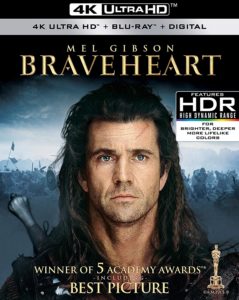 The superior work of the two Best Picture winners is BRAVEHEART (****, 1995, 177 mins., R; Paramount), Mel Gibson’s stirring 1995 Oscar winner that makes a most impressive leap to 4K. The superior work of the two Best Picture winners is BRAVEHEART (****, 1995, 177 mins., R; Paramount), Mel Gibson’s stirring 1995 Oscar winner that makes a most impressive leap to 4K.
This HDR-enhanced, Dolby Vision-capable transfer is a marked improvement over any prior home video release of the film. Greens are warmer, candles stand out in Longshanks’ castle, details are overall much more evident and the battle sequences prove more thunderous now with Dolby Atmos steering some of the audio overhead. It’s a beautiful presentation of a movie that mixes history and myth in a dynamic, sweeping manner – and yet its greatest asset is that it never loses the human component of William Wallace’s crusade, and particularly his personal losses, while framing the larger fight for Scotland’s independence. It’s a brilliant piece of filmmaking enhanced by James Horner’s atmospheric score – also as adept at capturing the film’s soulfulness as well as its powerful action sequences – and performances from Gibson and his supporting cast (Patrick McGoohan as King Edward I, Sophie Marceau, Catherine McCormack, and especially Angus Macfadyen as Robert the Bruce).
John Toll’s cinematography has long been one of the film’s chief assets, and the 4K UHD should give viewers a new appreciation for his and Gibson’s artistry. I recall first seeing this film in a small multiplex theater – in mono! – that did not do the picture justice at all. Neither did THX approved laserdiscs and DVDs, with the picture often appearing muddy and lacking detail. Paramount’s Blu-Ray far surpassed those releases, yet there’s no question the brighter contrast of 4K, higher bit-rate and precision detail benefit the picture all the more in Paramount’s UHD. It’s that impressive a transfer and one of the best UHD catalog releases to date.
Paramount has carried over the prior Blu-Ray double-disc release with its ample supplements, including Mel Gibson’s commentary and other Making Of segments. “Albu gu Brath! The Making of Braveheart’” is the set’s highlight, a 50-minute documentary sporting a Gibson interview and overview of the production, mixing archival footage with comments from the filmmaker, who rightly praises James Horner’s score in its closing moments. “A Writer’s Journey” profiles scribe Randall Wallace’s efforts in a 20-minute profile; “Tales of William Wallace” is a half-hour examination of the real Wallace; a handful of vintage interviews are also on-hand with numerous cast and crew members, while a photo montage and two trailers round out the package.
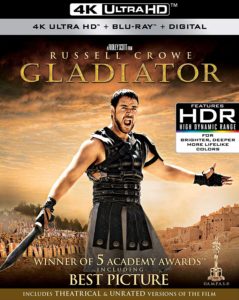 There’s something about the films of Ridley Scott that make them compelling regardless of their subject matter, and it doesn’t take someone who has spent too many hours in film school to understand why: the man is a master of filmmaking technique and camera-work. Even his most stilted of pictures — like the seemingly endless treatise on colonialism, 1492, which made even the Marlon Brando-Tom Selleck picture look good — boasted extravagant visuals, a true sense of time and place, and a spectacular use of Vangelis’s music that made you overlook (at least for a while) just how monotonous and empty the film itself was. There’s something about the films of Ridley Scott that make them compelling regardless of their subject matter, and it doesn’t take someone who has spent too many hours in film school to understand why: the man is a master of filmmaking technique and camera-work. Even his most stilted of pictures — like the seemingly endless treatise on colonialism, 1492, which made even the Marlon Brando-Tom Selleck picture look good — boasted extravagant visuals, a true sense of time and place, and a spectacular use of Vangelis’s music that made you overlook (at least for a while) just how monotonous and empty the film itself was.
But through all of Scott’s lesser pictures, there is a constant feeling that the director has long squandered his considerable talent on scripts that simply aren’t there, using his visuals to cover fundamental narrative flaws that are apparent in a fair amount of his work. He’s a great visual stylist but, perhaps, not quite a great storyteller, and there have been many times in his work where his directorial skills have far surpassed the material in bringing a picture to life.
That was the initial feel I had the first time I watched GLADIATOR (*** 155/170 mins., 2001, R),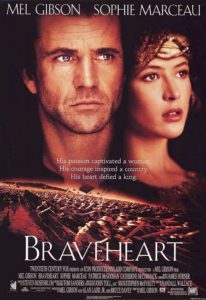 a picture that won numerous Oscars, made a ton of money, and was heavily hyped in the media. However, I always felt that those seeking an action-filled romp or a historical epic along the lines of “Fall of the Roman Empire” (which uses similar characters and dramatic entanglements as this film) may have been let down by the picture…turns out I was wrong, yet even now, I don’t feel that this is a “great” film on balance. a picture that won numerous Oscars, made a ton of money, and was heavily hyped in the media. However, I always felt that those seeking an action-filled romp or a historical epic along the lines of “Fall of the Roman Empire” (which uses similar characters and dramatic entanglements as this film) may have been let down by the picture…turns out I was wrong, yet even now, I don’t feel that this is a “great” film on balance.
“Gladiator” is an ideal film to analyze since it flirts with greatness but is ultimately undone by a pedestrian script, cobbled together by three different writers who were unable to bring a literate or interesting angle to screenwriting material almost as old as the Roman Empire itself. The movie is filled with so many cliches that its surprising lack of humor sticks out like a sore thumb, presenting its story in an almost totally stone-faced manner as if nobody has ever seen a film like it before. (Perhaps that was the film’s intention, since its original ESPN-driven marketing scheme was skewered specifically towards 18 year-old guys who were never exposed to a “Spartacus” or “Ben-Hur” — an audience that I felt would’ve been bored by the film’s mundane drawing room sequences).
No doubt, there is a lot of good in “Gladiator”: fine performances from an excellent cast, often stunning cinematography, exciting individual sequences, but, alas, a notable lack of story to fill an extravagant epic that runs 155 minutes. This is a movie that would like to be “Braveheart” but should have settled for being “The 13th Warrior,” and its dramatic motivation and tension is no more substantial than your old Saturday matinee filler, even though if its ambitions are far more than that.
It’s a “good but not great,” frustrating picture because there is so much to like in it: Russell Crowe is convincing as the Roman General whose family is killed by the tyrannical Emperor (Joaquin Phoenix) and vows revenge against the new Caesar. Connie Nielsen plays the Emperor’s sister, who once held deep emotions for the scarred warrior, but now attempts to help the former General rise up and restore the power of Rome to the people, and the Senate, where it belongs.
Fresh from his triumphant performance in “The Insider,” Crowe is believably gruff and perfect for the part, but the problem IS the part: after a solid first half-hour, Crowe has little to do for the rest of the movie but brood and convey an expression of “revenge!” while he spends much of the middle section off-screen, the action instead relegated to the mad ravings of Phoenix’s Emperor, and his relationship with sibling Nielsen.
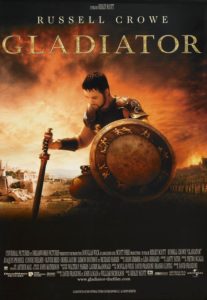 This, as it turns out, is where the focus and pacing of “Gladiator” have major problems: I didn’t much object to Phoenix’s performance as much as I did the interminable length of his scenes. The only conflict in “Gladiator”’s simplistic script is the Emperor, and he’s not exactly what you would call a multi-faceted villain. Movies have been made entirely about royalty gone mad (see “The Madness of King George” for one) before, but Phoenix’s screen time could have been cut in half and been twice as effective in this film. There are no side villains (unless you count one senator who has a brief sequence with Phoenix discussing political schemes), no subplots to enhance the antagonists. It’s Phoenix alone who creates the tension, and it’s simply not enough to anchor an entire dramatic conflict in this type of material around. This, as it turns out, is where the focus and pacing of “Gladiator” have major problems: I didn’t much object to Phoenix’s performance as much as I did the interminable length of his scenes. The only conflict in “Gladiator”’s simplistic script is the Emperor, and he’s not exactly what you would call a multi-faceted villain. Movies have been made entirely about royalty gone mad (see “The Madness of King George” for one) before, but Phoenix’s screen time could have been cut in half and been twice as effective in this film. There are no side villains (unless you count one senator who has a brief sequence with Phoenix discussing political schemes), no subplots to enhance the antagonists. It’s Phoenix alone who creates the tension, and it’s simply not enough to anchor an entire dramatic conflict in this type of material around.
Scott’s direction has its moments of flashy brilliance (despite a grainy, ugly appearance, the opening battle sequence is terrific), but some of his technique gets in the way this time. The first time we see Rome, he places a blue filter over the cityscape, thereby almost completely obscuring the power of the visuals. For all the digital CGI work in the movie, the film also feels oddly claustrophobic, with the only sense of grandeur coming in the coliseum sequences, which at times have the appearance of having been assembled on someone’s PC. A few shots where Crowe and Reed walk in the streets look as if they’re part of a backlot set, not the small part of a vast city.
The battle sequences are fine, but after a while, all the bloodletting in the world loses its power, and the hand-to-hand combat sequences just aren’t as pungent as I expected them to be, particularly coming from the filmmaker of “The Duelists.” Meanwhile, Crowe’s visions of his family and his beloved wheat field are far too similar to “Braveheart,” right down to an ending that only underscores how inferior this film is in relation to Gibson’s picture.
All of that said, “Gladiator” is certainly entertaining and worth a look on the big screen — or even better, Paramount’s 4K UHD, which once again offers a dynamic upgrade on previous home video releases. This is especially true because the studio’s initial Sapphire Series BD was hampered by excessive DNR, forcing a repressing that was much improved – yet still nowhere near the better-balanced, satisfying 4K UHD presentation afforded the film here. Once again backed by HDR, Dolby Vision and Dolby Atmos, this is a clear and substantial improvement on even that repressed Blu-Ray edition, with occasionally appreciable gains in color and clarity. Both the 155-minute theatrical cut and the 170-minute extended version are present and accounted for in 4K, with the included Blu-Ray double-disc edition housing all the extras from prior releases.
Digital HD copies are also included with slipcovers in these new Paramount 4K UHDs, which both come highly recommended – even if one epic is clearly superior to the other.
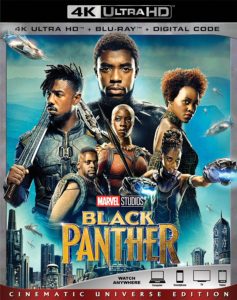 BLACK PANTHER 4K UHD Combo Pack (**½, 134 mins., 2018, PG-13; Marvel/Disney): Riding the wave of social justice (and with a few “white people” jokes for good measure), Marvel’s box-office behemoth “Black Panther” sticks close to the formula laid out by its genre predecessors – but its more diverse cast and crisp direction from “Creed”’s Ryan Coogler resulted in a film that overperformed at the box-office, becoming one of Disney’s biggest commercial hits in the process. BLACK PANTHER 4K UHD Combo Pack (**½, 134 mins., 2018, PG-13; Marvel/Disney): Riding the wave of social justice (and with a few “white people” jokes for good measure), Marvel’s box-office behemoth “Black Panther” sticks close to the formula laid out by its genre predecessors – but its more diverse cast and crisp direction from “Creed”’s Ryan Coogler resulted in a film that overperformed at the box-office, becoming one of Disney’s biggest commercial hits in the process.
It’s a familiar mix of colorful action, mostly humorous interplay between its ensemble – anchored by Chadwick Boseman’s Prince T’Challa, heir to the hidden African kingdom of Wakanda and the current Black Panther – and a routine plot involving a cast-off Wakandan (Michael B. Jordan) working with a nefarious arms dealer (Andy Serkis) in an effort to steal the country’s magical “vibranium” and level a personal score, with a direct connection, to T’Challa himself.
Backed by a sister who operates as this movie’s Q (Letitia Wright), a female warrior cohort (Danai Gurira) and a former flame (Lupita Nyong’o) more connected with Africa’s real struggles than comic book action, Boseman’s Black Panther goes through the typical trials of a Marvel hero – namely, trying to deal with his late father’s legacy – while bearing the responsibility of protecting his kingdom from the outside world. It’s not a particularly memorable story but the charismatic cast and Coogler’s handling of the action sequences – in primary colors that shine in 4K – make this entertaining enough…at least until it devolves into another routine Marvel slugfest that grows especially tedious by the end (it’s also strange how little of the costumed Black Panther there is in this film, the suit appearing only in less than a handful of scenes).
Disney’s 4K UHD of “Black Panther” looks sensational with HDR and Dolby Atmos audio – reds and oranges particularly stand out during the film’s Korean set-piece in a pleasingly varied visual presentation. Extras include all the usual Marvel standbys (deleted scenes, a gag reel, Making Of segments) plus a Blu-Ray and Digital HD copy.
Shout Factory New Releases
Larry Cohen’s filmography is littered with all kinds of B-movie experiences, with the auteur of self-made low-budget horror netting his biggest smash with IT’S ALIVE (**½, 91 mins., 1974, PG) – the “killer baby” hit Cohen produced for Warner Bros. in the mid ‘70s.
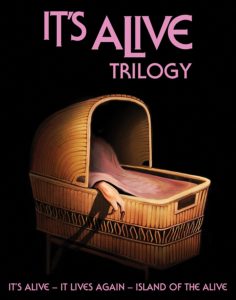 Interestingly, the original “It’s Alive” – which follows distraught father John P. Ryan as his newborn son turns out to be a mutated killer with fangs and googily-eyes – wasn’t a success right off the bat. The picture died upon its original release and received a second life when it played well internationally. Thanks to that foreign revenue and a regime change at Warner Bros., “It’s Alive” was re-released in 1977 and basically found its audience years after the fact (a rare occurrence even in the pre-home video era). Interestingly, the original “It’s Alive” – which follows distraught father John P. Ryan as his newborn son turns out to be a mutated killer with fangs and googily-eyes – wasn’t a success right off the bat. The picture died upon its original release and received a second life when it played well internationally. Thanks to that foreign revenue and a regime change at Warner Bros., “It’s Alive” was re-released in 1977 and basically found its audience years after the fact (a rare occurrence even in the pre-home video era).
While not a genre classic – it’s a decent if clunky picture enhanced by one of Bernard Herrmann’s later scores – “It’s Alive” still provides modest amusement, especially for genre fans with an appreciation for its era. Its eventual commercial success led to Cohen producing an inevitable (and inferior) sequel, IT LIVES AGAIN (**, 91 mins., 1978, R), this time with Frederic Forrest and Kathleen Lloyd as the new parents of one of the mutated tykes, as well as the belated IT’S ALIVE III: ISLAND OF THE ALIVE (**, 95 mins., 1987, R). The latter was – along with Cohen’s “A Return to Salem’s Lot” – one of two sequels Cohen produced for Warner Bros.’ home video division, and offers Michael Moriarty in a much looser, and at-times comical, follow-up to his ‘70s efforts.
All three of Cohen’s “It’s Alive” films have been collected in Shout Factory’s IT’S ALIVE TRILOGY, a three-disc Blu-Ray box-set marking not just the series’ high-def debut but also the start of a new licensing deal between Shout and Warner Bros. (with some exciting genre films like “Curse of the Cat People” to follow over the coming months). All three 2K-scanned, 1080p (1.85) AVC encoded/DTS MA (mono on 1 & 2, stereo on “Island”) presentations are nice and natural looking – free from DNR – and offer Cohen commentaries on the trio, trailers/radio/TV spots, still galleries, and a couple of retrospective featurettes. These include new comments from Cohen, Michael Moriarty, Laurene Landon, and make-up artist Steve Neill, along with Jon Burlingame who discusses Herrmann’s scoring. There’s also footage from a recent NuArt screening of the original as well as its subsequent Q&A session with Cohen. For fans, the set is well worth a look.
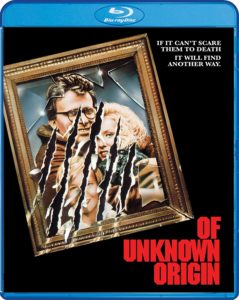 More enjoyable on balance is another Scream license from Warner, OF UNKNOWN ORIGIN (***, 89 mins., 1983, R). This is a nifty little thriller that provides a young Peter Weller a terrific stage as a yuppie who straddles the line between smug obnoxiousness and audience sympathy – in other words, playing right into Weller’s strengths as his Wall Street broker has to deal with a rat that’s infested his Manhattan brownstone. With his wife and son out of town, Weller takes matters into his own hands in an enjoyably low-key Canadian production helmed by George P. Cosmatos and scored by Ken Wannberg. Though not especially scary, “Of Unknown Origin” works just as well as a character study and showcase for the future “Robocop” star, and functions splendidly on its modest terms. More enjoyable on balance is another Scream license from Warner, OF UNKNOWN ORIGIN (***, 89 mins., 1983, R). This is a nifty little thriller that provides a young Peter Weller a terrific stage as a yuppie who straddles the line between smug obnoxiousness and audience sympathy – in other words, playing right into Weller’s strengths as his Wall Street broker has to deal with a rat that’s infested his Manhattan brownstone. With his wife and son out of town, Weller takes matters into his own hands in an enjoyably low-key Canadian production helmed by George P. Cosmatos and scored by Ken Wannberg. Though not especially scary, “Of Unknown Origin” works just as well as a character study and showcase for the future “Robocop” star, and functions splendidly on its modest terms.
Scream’s Blu-Ray edition of the film boasts a thoroughly satisfying 1080p (1.85) AVC encoded transfer that’s been newly scanned in 2K from the Interpositive and appears finely textured throughout. In addition to DTS MA mono audio, extras include new interviews with executive producer Pierre David – discussing Canada’s push into the English language theatrical market during the late ‘70s/early ‘80s – plus writer Brian Taggert, the trailer, and an archival DVD commentary with Weller and Cosmatos.
Shout Select releases their own edition of David Lynch’s WILD AT HEART (**, 127 mins., 1990, R) on May 22nd. This is the director’s highly stylized adaptation of Barry Gifford’s novel that features a few allusions to “The Wizard of Oz.” I have to confess that I’m not a particular fan of this movie – or Lynch for that matter – but aficionados of the picture are sure to appreciate the top-notch 1080p AVC encoded (1.85) transfer and 5.1 DTS MA sound of Shout’s release. The disc also offers a reprisal of extras from earlier editions, but all in one place for the first time (Twilight Time’s Blu-Ray only included a few of these, for instance). The supplements include an hour of deleted scenes, the “Love Death, Elvis and Oz” documentary, extended interviews, Lynch on the DVD process, the 1990 EPK, and a brand-new, Shout-exclusive interview with Gifford himself, reflecting on the film and working with Lynch......Now available from Shout! is DESOLATION (76 mins., 2017, Not Rated), an IFC/Scream presentation starring Jaimi Page as a grieving widow who heads to the forest to scatter her husband's ashes along with her teen son (Toby Nicols) and best friend (Alyshia Ochse). The trio run afoul of a mysterious, sunglass-wearing stranger named The Hiker in a routine outing from director Sam Patton that's all too familiar. Shout's Blu-Ray includes a 1080p (1.78) AVC encoded transfer and 5.1/2.0 DTS MA sound.
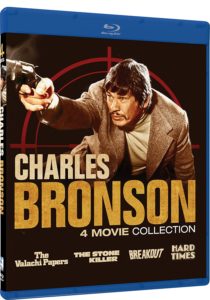 Mill Creek New Releases Mill Creek New Releases
Easily one of Mill Creek’s most satisfying multi-disc sets to date, the CHARLES BRONSON 4 MOVIE COLLECTION gives you four Bronson ‘70s films produced for Columbia Pictures on Blu-Ray. Three of them have already been released by Twilight Time, but for $10 and with these transfers originating from the same source materials, what’s not to love?
The set’s most notable inclusion – especially because Twilight Time’s 2013 Blu-Ray sold out some time ago – is clearly HARD TIMES (***, 94 mins., 1975, PG), Walter Hill’s terrific little period drama that offers Bronson one of his finest roles.
The screenplay by Hill, making his feature debut, and original writers Bryan Gindoff and Bruce Henstell is simple in its set-up and execution: during the Great Depression, loner Chaney (Bronson) wanders into a street fight and decides to take what’s left of his cash and bet it on himself. Chaney proves to be a winner and promoter/hustler “Speed” (James Coburn) immediately tries to strike up a future relationship – one that Chaney is reluctant to participate in. Eventually, Chaney’s reputation spreads throughout New Orleans and Speed manages to set up a fight with a local businessman who wants to bring in a top Chicago fighter to tango with Bronson’s brawler.
Speed’s debt to local mobsters and Chaney’s relationship with a woman (Jill Ireland) whose husband is in jail are about the only dramatic gears “Hard Times” shifts into throughout the course of its tidy 93 minutes, but that’s part of the film’s appeal. Bronson, Coburn and Strother Martin (as an opium-addicted former med student) all embody their roles with an authenticity that’s enhanced by Hill’s eye for the material’s location and surroundings. “Hard Times” isn’t an overly gabby picture, but of course, these men weren’t talkative sorts – as Ireland’s female lead tries to convey to her real-life, off-screen husband, their relationship can’t progress because he can’t open up. Still, seasoned viewers familiar with Bronson can sense the man’s soul without him having to speak a word, and that goes with the actor’s performance here – one of his best in a career that would soon be populated by B-grade action pictures made for the Cannon Group.
“Hard Times” was impressively shot by Philip Lathrop in Panavision and edited by Roger Spottiswoode, who later would helm a number of fine pictures including “Under Fire.” Unfortunately, the filmmakers’ efforts would be compromised for many years in poor pan-and-scan TV transfers, as “Hard Times” was only released in widescreen once, in an out-of-print Sony DVD.
Working from a gorgeous, immaculate print from the Columbia vaults, Mill Creek’s Blu-Ray repurposes the same Sony master that comprised Twilight Time’s out-of-print Blu-Ray, capturing Hill and Lathrop’s effective use of anamorphic photography, while the PCM stereo soundtrack is on par with the 5.1 DTS MA track from TT’s edition (at least when matrixed into surround), stereophonically rechanneling the picture’s low-key mix of location sound and Barry DeVorzon’s score. This is a strong a/v presentation that restores the picture’s rightful place as one of its legendary star’s better vehicles.
Two other Bronson pictures that previously appeared on Twilight Time discs are also on-hand here.
THE VALACHI PAPERS (**½, 125 mins., 1972, PG): An interesting, if crudely-made, Dino DeLaurentiis production stars Bronson as Joseph Valachi, one of the earliest mob informants. After being given the “kiss of death” by crime boss Vito Genovese (Lino Ventura) while in prison, an aging Valachi spills the beans to the FBI, becoming an informant in the early ‘60s. Valachi then recounts his life on the streets of New York City with another mafia don, Salvatore Maranzano (Joseph Wiseman); his marriage to another mobster’s daughter (Jill Ireland); assorted grizzly mafia adventures (including putting a castrated man out of his misery); and eventual conviction on heroin trafficking.
James Bond vet Terence Young helmed “The Valachi Papers,” which Stephen Geller (along with a pair of Italian writers) adapted from Peter Maas’ non-fiction account of Valachi’s testimony to the federal government. It’s a compelling but convoluted picture, shot mostly in Italy, that gives off a strange vibe with its mostly-dubbed dialogue and sloppy production errors – including a NYC skyline with the World Trade Center front and center of the frame, in scenes set in the 1920s! The narrative also feels disjointed at times, compounding its shortcomings. Nevertheless, “The Valachi Papers” is worth a look for Bronson aficionados and mafia movie buffs alike – even if it does not live up to “NBC-TV Chicago”’s hilarious critic quote that asks “Is it as good as ‘The Godfather’? The answer is…no, it is better”!
Mill Creek’s Blu-Ray again works from the same 1080p Sony (1.85) AVC encode as the TT release. Detail is as strong as the occasionally weathered source material allows; I’m not sure what kind of budget “Valachi” was shot with, but it certainly does not give off the impression of an expensive production, with claustrophobic sets and rather flat cinematography dominating most of the action. The PCM mono sound is a bit rough as well, with Riz Ortolani’s score backing up the action.
Ultimately, “Valachi” marked Bronson’s third and final outing with Terence Young. It isn’t as entertaining as their collaboration on the offbeat Japanese western “Red Sun” (I’ve never seen the scarcely-distributed “Cold Sweat”), but it’s an intriguing film from its era – with fascinating source material – let down by inferior production values.
THE STONE KILLER Blu-Ray (**½, 95 mins., 1973, R): Inbetween “The Mechanic” and “Death Wish,” Bronson and director Michael Winner teamed on this lesser-known hybrid of cop-thriller and mafia drama. Bronson here stars as a tough NYC cop pursuing a mobster (Martin Balsam) carrying out a decades-long vengeance via Vietnam veterans who’ve been hired out as hitmen.
Another Dino DeLaurentiis production, “The Stone Killer” is well-executed and interesting, though the Gerald Wilson script – adapted from a novel by British author John Gardner (who later wrote several James Bond novels) – is at times hard to follow. Roy Budd’s ‘70s scoring dates the film as well, though for some, that won’t be a bad thing at all. Mill Creek’s Columbia-licensed 1080p (1.85) AVC encoded transfer seems more or less equivalent to the earlier Twilight Time release: colors are strong despite the movie’s at-times grimy ‘70s location shooting, details are likewise crisp, and the PCM mono sound is passable.
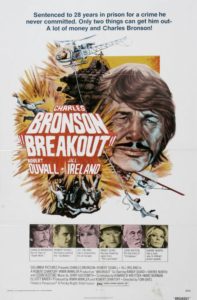 BREAKOUT (**, 96 mins., 1975, PG) makes its Blu-Ray debut in this set and in some ways it’s the weakest of the lot – both for its dated high-def master and the film itself. Director Tom Gries’ movie can’t seem to make up its mind as to whether it wants to follow the plight of framed American businessman Robert Duvall – sent to rot in a Mexican prison for a murder he didn’t commit – or the rough and tumble pilot (Bronson) Duvall’s wife (Jill Ireland) hires to spring him out. Eventually, “Breakout” settles in on the efforts of Bronson and his team (including Randy Quaid and Sheree North) and plods along before the movie’s “big climax,” which doesn’t amount to anything particularly exciting. BREAKOUT (**, 96 mins., 1975, PG) makes its Blu-Ray debut in this set and in some ways it’s the weakest of the lot – both for its dated high-def master and the film itself. Director Tom Gries’ movie can’t seem to make up its mind as to whether it wants to follow the plight of framed American businessman Robert Duvall – sent to rot in a Mexican prison for a murder he didn’t commit – or the rough and tumble pilot (Bronson) Duvall’s wife (Jill Ireland) hires to spring him out. Eventually, “Breakout” settles in on the efforts of Bronson and his team (including Randy Quaid and Sheree North) and plods along before the movie’s “big climax,” which doesn’t amount to anything particularly exciting.
Despite the cast and premise, “Breakout” is a disappointment – a letdown that extends to Jerry Goldsmith’s unmemorable score – though it does boast one of the most unintentionally funny “dummy deaths” in film history, looking more like a piñata being broken apart than a human body!
I’ve seen “Breakout” on Blu-Ray in a recent German release and Mill Creek’s presentation is comparable. Both are hampered by what appears to be an older HD master, which while preserving the film’s 2.35 frame, offers some noise and other occasional flaws atypical of most Sony catalog transfers. It’s still passable, but it’s definitely the weakest transfer of the batch. The PCM mono sound is OK though there’s not much to take away from in Goldsmith’s score, at least from a thematic standpoint.
No extras are included in the two-disc set – but who cares? At $10, this is a must-have for Bronson buffs – one of Mill Creek’s finest releases yet and the singular best Blu-Ray bargain of the year.
Also new from Mill Creek this month on Blu-Ray is THANK GOD IT’S FRIDAY (90 mins., 1978, PG), a Columbia disco turkey that’s become a cult favorite for its soundtrack (including the Oscar-winning Donna Summer classic “Last Dance”) and cast, which counts Debra Winger and Jeff Goldblum among its ensemble. If you enjoyed the likes of “Xanadu” and “Can’t Stop The Music,” you should get a kick out of “TGIF,” making its Blu-Ray debut from Mill Creek with a spiffy 1080p (1.85) AVC encoded transfer and tuneful 2.0 PCM stereo soundtrack…Finally, JOHN TRAVOLTA: 4 IN 1 COLLECTION is another two-disc Blu-Ray compilation that houses HD transfers of “Basic,” “Lonely Hearts,” “Love Song For Bobby Long” and “Perfect.” Sadly, the latter is only included in the same cropped 1.85 transfer (standard-def upscale) as Mill Creek’s earlier Blu-Ray, so there’s nothing new on that front.
 Also New & Noteworthy Also New & Noteworthy
PBS Releases: PBS brings us a trio of new documentaries this month on DVD. PREDICTION BY THE NUMBERS (60 mins., 2018) looks at the art involved in making predictions, from casinos to game shows and weather forecasts – a varied topic that’s made entertaining in Daniel McCabe’s hour-long program…GREAT ESCAPE AT DUNKIRK (60 mins., 2018), meanwhile, fills in the factual gaps that Christopher Nolan’s film didn’t do, recruiting archaeologists, historians and divers as they recover the remains of lost ships and planes from the epic operation. Along the way they also debunk myths about the event and excavate a newly-found Spitfire wreck…The marvelous GI JEWS – JEWISH AMERICANS IN WORLD WAR II (90 mins., 2018) paints a well-rounded portrait of the 550,000 Jewish men and women who served for the U.S. in WWII, encountering prejudice both at home and on the battlefield, as well as occasionally among their fellow troops. Lisa Ades’ production offers interviews with a number of WWII vets including Mel Brooks, Carl Reiner, Henry Kissinger and Max Fuchs among others, as well as extended interviews in the supplemental section with Reiner and Brooks. Widescreen transfers and stereo soundtracks adorn all three DVDs.
Debuting on Blu-Ray May 15th from PBS, UNFORGOTTEN Season 2 (270 mins., 2016) finds Nicola Walker and Sanjeev Bhaskar reprising their roles of DCI Cassie Stuart and DI Sunny Khan. The duo are once again tasked with a seemingly impenetrable cold case that leads to a complicated scenario with a lawyer, nurse, schoolteacher and police officer all counted among the suspects. “Unforgotten”’s second season is presented on two discs with 1080i transfers and 2.0 soundtracks, all in the series’ uncut UK broadcast version…Finally, Masterpiece turns its attention to a winning dramatization of an American classic, Louisa May Alcott’s LITTLE WOMEN (175 mins., 2018), an enjoyable production from writer Heidi Thomas and director Vanessa Caswill. The cast includes Emily Watson as Marmee with Maya Hawke, Kathryn Newton, Annes Elwy, Michael Gambon and Angela Lansbury among a superb ensemble with strong production values – all beautifully presented in a 1080p Blu-Ray with 5.1 audio. Three featurettes round out the disc, which streets on May 22nd.
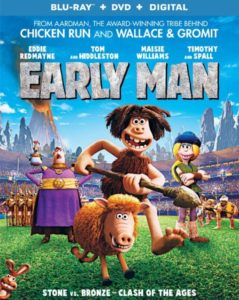 EARLY MAN Blu-Ray (89 mins., 2018, PG; Lionsgate): The Wallace & Gromit team head to the prehistoric with this genial story of a caveman (voiced by Eddie Redmayne) who bands his ramshackle tribe together against the more sophisticated Lord Nooth (Tom Hiddleston) and his Bronze Age City empire. As always with Aardman, there are loads of playful gags and likeable characters in Nick Park’s latest creation, making for a jolly good time for kids and adults alike. Lionsgate’s Blu-Ray is out this week boasting a 1080p (1.85) AVC encoded transfer, Dolby Atmos sound (featuring a Harry Gregson-Williams/Tom Howe score), DVD, Digital HD copy, and several behind-the-scenes featurettes. EARLY MAN Blu-Ray (89 mins., 2018, PG; Lionsgate): The Wallace & Gromit team head to the prehistoric with this genial story of a caveman (voiced by Eddie Redmayne) who bands his ramshackle tribe together against the more sophisticated Lord Nooth (Tom Hiddleston) and his Bronze Age City empire. As always with Aardman, there are loads of playful gags and likeable characters in Nick Park’s latest creation, making for a jolly good time for kids and adults alike. Lionsgate’s Blu-Ray is out this week boasting a 1080p (1.85) AVC encoded transfer, Dolby Atmos sound (featuring a Harry Gregson-Williams/Tom Howe score), DVD, Digital HD copy, and several behind-the-scenes featurettes.
THE TWO OF US Blu-Ray (86 mins., 1967; Cohen): Claude Berri’s 1967 success paints a portrait of the relationship between an eight-year-old Jewish boy (Alain Cohen) living in Nazi-occupied France, and the grandfather (Michel Simon) of his Catholic friends, who lives in the country and makes a connection with the boy, even though he doesn’t know of his background (and never will). This is a tenderly played and extremely emotional film, funny and heartwarming but not phony, executed perfectly by Berri who scripted with Gerard Brach. Cohen’s transfer is based on a new 4K restoration of this world cinema classic, presented here in a extremely high bit-rate B&W transfer with French PCM mono sound; a commentary by Wade Major; and the 2017 re-release trailer.
 RICK & MORTY Season 3 DVD (220 mins., 2018; Warner): The latest season of the zany Cartoon Network Adult Swim series is unleashed on DVD May 15th from Warner. Uncensored episodes make this strictly for older viewers, with all 10 episodes from Season 3 on-hand. Extras include animatics for every episode; 13 commentaries with creators, cast and crew; Inside the Recording Booth segments; an Origins of Rick & Morty featurette; Inside the Episode materials; 16:9 transfers and 5.1 soundtracks. RICK & MORTY Season 3 DVD (220 mins., 2018; Warner): The latest season of the zany Cartoon Network Adult Swim series is unleashed on DVD May 15th from Warner. Uncensored episodes make this strictly for older viewers, with all 10 episodes from Season 3 on-hand. Extras include animatics for every episode; 13 commentaries with creators, cast and crew; Inside the Recording Booth segments; an Origins of Rick & Morty featurette; Inside the Episode materials; 16:9 transfers and 5.1 soundtracks.
THE SHANNARA CHRONICLES – Season Two Blu-Ray (484 mins., 2018; Paramount): Paramount Network’s fantasy series enters its second season, finding The Four Lands in chaos. The populace is terrified by the re-emergence of magic while The Crimson is hunting down magic users, including Wil Ohmsford, who’s brought back into the fight after a mysterious woman named Maretha saves his life. This young-adult series has proven to be a fairly popular one for the rebranded Paramount Network, with Paramount’s Season 2 Blu-Ray out this week. In addition to 1080p transfers and 5.1 Dolby TrueHD soundtracks, the Blu-Ray includes a number of behind-the-scenes featurettes.
 In Theaters In Theaters
THE AVENGERS – INFINITY WAR (**½, 155 mins., PG-13): Much in the same way that the last “Captain America” movie was more of an “Avengers” film, “The Avengers: Infinity War” is less about the super-hero team itself than it is an “All-Star Marvel” rally – something like a “Giant Sized Annual” issue – featuring most of the characters from the Disney company’s first decade operating as its own movie studio.
It’s undoubtedly an impressive achievement that Marvel has been able to dominate the box-office, even with lower-profile heroes, across a pair of films each year – yet this sprawling and repetitive new movie again illustrates that the best of these assembly-line products lies in the respective characters’ solo outings, and not in an ensemble setting.
“Infinity War”’s story by the “Captain America” team of Christopher Markus and Stephen McFeely is so basic that it could’ve been concocted by a grade school Marvel fan: Thanos, the CGI villain portrayed by Josh Brolin, nearly has his hand literally on all the Infinity Stones (seen in a myriad of Marvel films) that will enable him to take control of the universe. It’s up to all sorts of heroes to stop him – with directors Anthony and Joe Russo (again vets of the last two Cap pictures) splitting the characters up into different units, including the Guardians of the Galaxy (where Zoe Saldana’s Gamora proves vital to the story), a fractured Avengers team itself still divided in two camps (Captain America and Black Widow on one side, Iron Man and Hulk on the other), plus Doctor Strange, Spider-Man, and the Black Panther squad for good measure.
There’s some entertaining interplay between the Guardians and Thor early in the film, yet if there’s any surprise to be found in “Infinity War,” it’s how little the movie does with its vast cast of characters (in fact, I found it more interesting looking at the credits and trying to piece together how an assortment of agents figured out the actors’ contractual billing). The story cuts from one group of heroes fulfilling some kind of mundane task while fighting enemies, to another group of heroes doing the same thing, just in a different setting. There’s scant effort to develop characterizations beyond the expected snarky line of dialogue here or there — but there’s plenty of pounding bad guys into submission, over and over again. The end result is sure to please most comic book fans, but from an objective dramatic standpoint, the movie gives you next to nothing to care about – and with “Infinity War 2” coming next year, it predictably ends on a bleak cliffhanger, relying solely on the good guys figuring it out…which of course, they’ll do, but only after another 2½ hours of dull CGI battles likely as interchangeable as the next.
NEXT TIME: Another Mel Gibson hit, THE PATRIOT, also makes its way to 4K, plus Arrow/MVD new releases. Until then, don’t forget to drop in on the official Aisle Seat Message Boards and direct any emails to our email address. Cheers everyone!
|